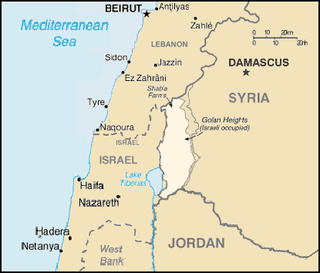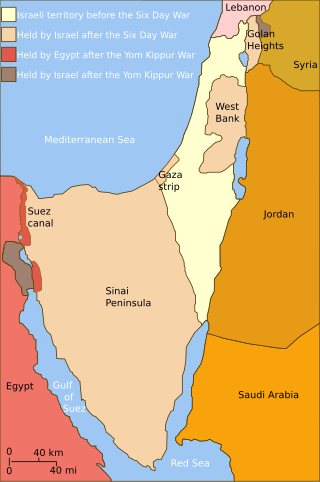
A United Nations Security Council resolution (UNSCR) is a United Nations resolution adopted by the Security Council (UNSC), the United Nations (UN) 15-member body charged with "primary responsibility for the maintenance of international peace and security".
A United Nations General Assembly resolution is a decision or declaration voted on by all member states of the United Nations in the General Assembly.

United Nations Security Council resolution 497, adopted unanimously on 17 December 1981, declared that the Israeli Golan Heights Law, which effectively annexed the Golan Heights, is "null and void and without international legal effect" and further calls on Israel to rescind its action.

The United Nations Security Council veto power is the power of the five permanent members of the UN Security Council to veto any decision other than a "procedural" decision.

United Nations Security Council Resolution 339 was adopted on 23 October 1973 in order to bring a ceasefire in the Yom Kippur War where Resolution 338 two days before had failed.

United Nations Security Council Resolution 350, adopted on 31 May 1974, established the United Nations Disengagement Observer Force, to monitor the ceasefire between Israel and Syria in the wake of the Yom Kippur War. UNDOF was initially established for a period of six months, but has had its mandate renewed by subsequent resolutions.

United Nations Security Council Resolution 83, adopted on June 27, 1950, determined that the attack on the Republic of Korea by forces from North Korea constituted a breach of the peace. The Council called for an immediate cessation of hostilities and for the authorities in North Korea to withdraw their armed forces to the 38th parallel. They also noted the report by the United Nations Commission on Korea that stated North Korea's failure to comply with Security Council Resolution 82 and that urgent military measures were required to restore international peace and security.

United Nations Security Council Resolution 393, adopted on July 30, 1976, after a letter from a representative from Zambia, the Council condemned a recent attack by South Africa in Zambian territory, resulting in the destruction of property and loss of life. The resolution went on to express concern at South Africa's occupation and use of South West Africa as a base for attacking neighbouring African countries, and that the continuation of this would constitute a threat to international peace and security.

United Nations Security Council resolution 730, adopted unanimously on 16 January 1992, after recalling resolutions 719 (1991) and 729 (1992) the Council approved a report by the Secretary-General from 14 January, and decided to terminate the mandate of the United Nations Observer Group in Central America (ONUCA) with effect from 17 January 1992.

United Nations General Assembly Resolution 62/243, titled "The Situation in the Occupied Territories of Azerbaijan", is a resolution of the United Nations General Assembly about the situation in Nagorno-Karabakh, which was adopted on March 14, 2008 at the 62nd session of the General Assembly. It became the seventh United Nations document concerning Nagorno-Karabakh and the third and last United Nations General Assembly document on it.

United Nations Security Council Resolution 1738, adopted unanimously on December 23, 2006, after reaffirming resolutions 1265 (1999), 1296 (2000), 1502 (2003) and 1674 (2006) on the protection of civilians in armed conflict, the Council condemned attacks against journalists in conflict situations. It was the last resolution adopted by the Security Council in 2006.

United Nations Security Council Resolution 2016 was unanimously adopted on 27 October 2011 on the situation of Libya during the Libyan Civil War.
A referendum on remaining in the Comoros was held in Mayotte on 8 February 1976. The proposal was rejected by 99.42% of voters.

United Nations Security Council Resolution 2166, concerning the shootdown of Malaysia Airlines Flight 17, was sponsored by Australia and adopted unanimously on 21 July 2014. The resolution expressed support for the "efforts to establish a full, thorough and independent international investigation into the incident in accordance with international civil aviation guidelines" and called on all United Nations member states "to provide any requested assistance to civil and criminal investigations".
The Declaration on the Rights of Peasants is a United Nations General Assembly resolution on human rights with "universal understanding", adopted by the United Nations in 2018. The resolution was passed by a vote of 121-8, with 54 members abstaining.

The eleventh emergency special session of the United Nations General Assembly opened on 28 February 2022 at the United Nations headquarters. It addresses the Russian invasion of Ukraine. Maldivian politician Abdulla Shahid served as President of the body during this time.

United Nations Security Council Resolution 2623 called for the eleventh emergency special session of the United Nations General Assembly on the subject of the 2022 Russian invasion of Ukraine. Albania and the United States introduced the resolution before the United Nations Security Council, which adopted it on 27 February 2022. Russia voted against while China, India and the United Arab Emirates abstained. As this was a procedural resolution, no permanent member could exercise their veto power.

United Nations General Assembly Resolution ES‑11/1 is a resolution of the eleventh emergency special session of the United Nations General Assembly, adopted on 2 March 2022. It deplored Russia's invasion of Ukraine and demanded a full withdrawal of Russian forces and a reversal of its decision to recognise the self-declared People's Republics of Donetsk and Luhansk.

United Nations General Assembly Resolution ES‑11/4 is the fourth resolution of the eleventh emergency special session of the United Nations General Assembly, adopted on 12 October 2022, following Resolution ES-11/3 which was adopted on 7 April 2022.
















